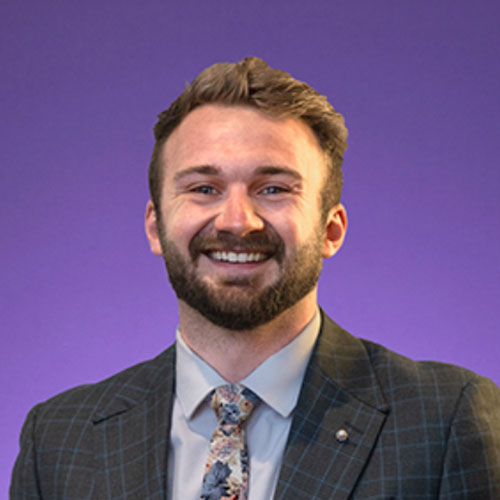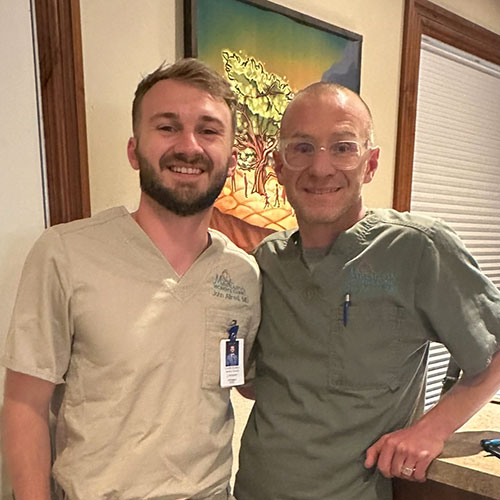
“Behind my medical education stands a quieter but powerful force: scholarships. Scholarships allowed me to focus on medicine — not money.”
For me, the decision to go into medicine was never about prestige or a paycheck. It has always been about helping others, teaching the next generation and building strong connections with my community. My story is one of intentionality and the transformative power of support, especially scholarships.
I was raised in Rexburg, Idaho, where I found joy in the outdoors, the quiet strength of a small-town community and the steady example of my father, an OB-GYN.
Even though I was born into a family of physicians, I initially considered other paths. But a strong desire to serve others around the world eventually brought me back to medicine. Since I was young, I’ve been involved in global outreach. I organized an Eagle Scout project to deliver shoes to orphanages in Ecuador and later served on a church mission in Chile.
When I returned home speaking Spanish, I was able to work at my dad’s clinic as an interpreter. That’s when it clicked for me: Medicine could be the path that brought together my interests and values.
This led me to the University of Washington School of Medicine and the WWAMI program, which serves Washington, Wyoming, Alaska, Montana and Idaho. The program gave me a wide range of experiences, from clinical rotations in Boise and Bozeman to academic work in Seattle, allowing me to pursue a high-quality education while staying close to family.
Lessons of a crisis
During medical school, my wife Catherine and I welcomed three children — something we wouldn’t change for the world. It’s the greatest decision we’ve made.
Still, balancing school and family life wasn’t easy. Medical school was more challenging than I expected, especially with a young family. We didn’t fully grasp how much moving around would affect our routines. But the UW School of Medicine gave me access to the people and opportunities I needed to grow.
To stay connected, my wife and I became intentional with our time, holding weekly planning meetings, sending videos and recording stories for the kids.
That connection was tested during one of the hardest moments of our lives. During my first year of medical school, my wife went into preterm labor at 23 weeks. We were airlifted from the hospital in Moscow, Idaho, to a hospital in Spokane with a high-level neonatal intensive care unit. Doctors warned us we would likely lose the baby.
That moment put everything into perspective. I knew a few things medically, but what mattered most then was prayer, community and support from my professors.
Our daughter survived and recently turned three. That experience shaped how I care for patients. It taught me that medicine can’t always heal the body, but your humanity can heal the soul. It reminded me why I chose medicine in the first place and pushed me to look for other ways to make a difference beyond direct patient care.
Breaking language barriers
One of those ways I was able to make a difference was through my research work at Seattle Children’s Hospital. I had the privilege of working with Juliana Bonilla-Velez, MD, a pediatric ear, nose and throat (ENT) surgeon. Under her mentorship, I joined a research team focused on improving care for Spanish-speaking patients.
We studied how language barriers affect outcomes, like complications after tonsillectomies, and worked to improve appointment access for non-English-speaking families. Our goal was to close gaps in care and help make the healthcare system more accessible for every family, regardless of their language.
That work earned me a spot on the Husky 100, an honor given to students at the University of Washington who make a meaningful impact both inside and outside the classroom.
But the credit didn’t belong to me alone. It was a group effort — led by my mentor, supported by our research group and made possible by my wife, who supported me every step of the way.

“As I step into the next chapter, I carry forward the lessons of my father, the strength of my community and a mission rooted in service.”
A legacy of love
During my third year of medical school, I had the rare chance to complete my OB-GYN rotation alongside my father, John Allred, MD, and his medical partners at the Idaho WWAMI site. It was a meaningful time, both professionally and personally, as I watched my father practice medicine with deep care and intentionality.
But while working with my dad, I began to notice subtle signs that something was wrong. Fresh off my neurology rotation, I saw symptoms of a neurological disorder and feared what they might mean.
I’ll never forget the call. I was sitting alone in a resident room on my internal medicine rotation when my dad told me he had been diagnosed with amyotrophic lateral sclerosis, also known as ALS, and had a short time left. There was no cure, just the unbearable task of walking my father — my mentor and my friend — toward the end of his life.
His diagnosis and passing left a deep impact. People from across his life reached out to share how his quiet, intentional love had shaped them.
I once asked him if it was all worth it, knowing he would retire so soon after giving so much. He told me, “Lean into adversity. It’s worth it if you leave a loving mark on this world.” That has stayed with me.
Now, my family and I are preparing to begin residency in otolaryngology — ear, nose and throat surgery — at the University of Michigan.
Looking ahead, I hope to return to academic medicine and help launch an ENT residency program in Idaho. Right now, there isn’t an academic ENT training program in Idaho, but a city like Boise could support it. If the opportunity comes, I’d love to be part of helping build it.
Medicine, not money
Behind my medical education stands a quieter but powerful force: scholarships.
They gave me peace of mind. I still carry debt, but it’s manageable. Scholarships allowed me to focus on medicine — not money.
More than that, they gave me the freedom to choose a path based on purpose, not pressure. Whether it’s primary care or academic medicine, scholarships make it possible to follow what you love and serve where you’re needed most.
As I step into the next chapter, I carry forward the lessons of my father, the strength of my community and a mission rooted in service.
We all have a story to write in medicine. And how we write that story, by being kind, authentic and leaving a legacy of love, is what truly matters.
As told to Patsy Cadwell


